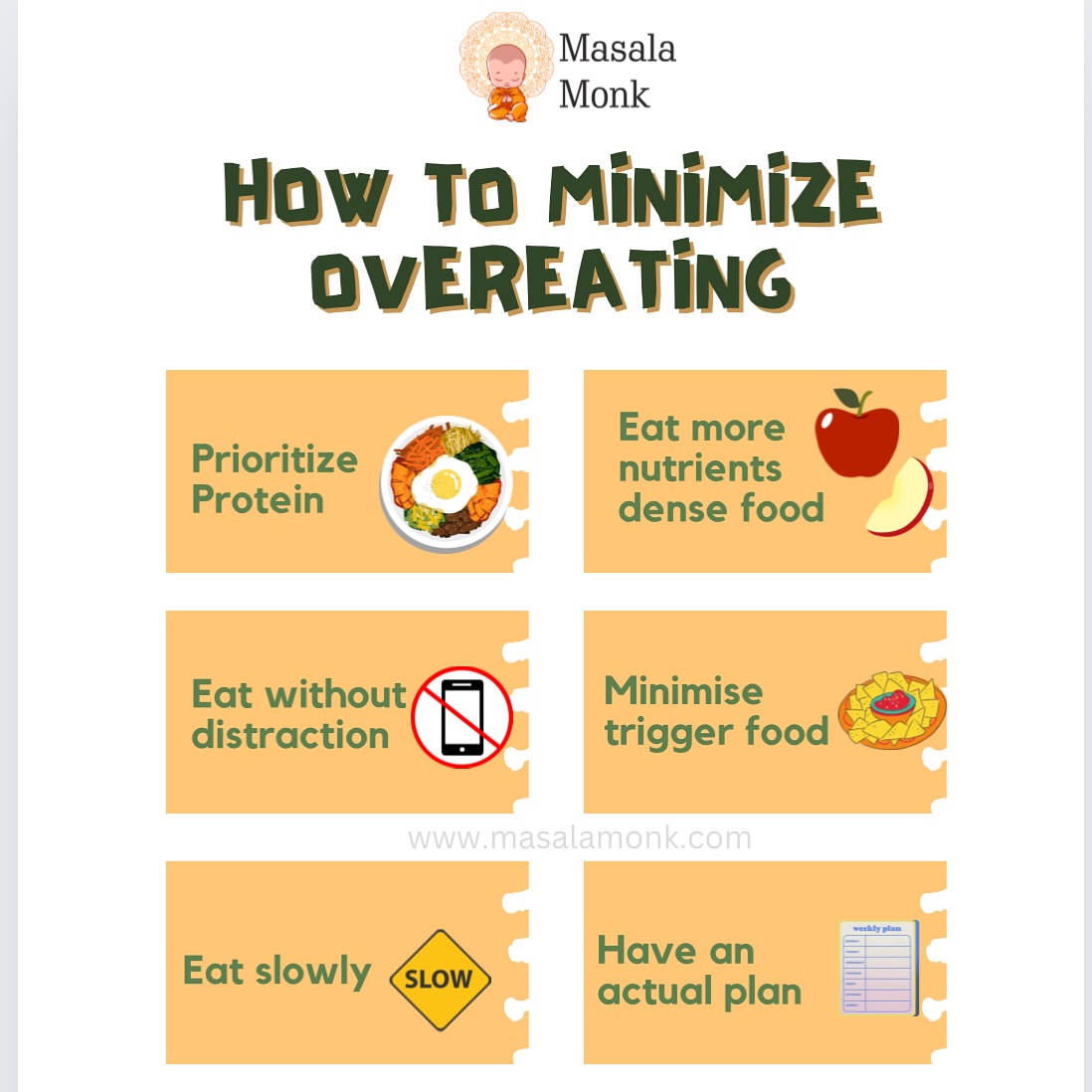
Overeating is a common issue that can disrupt our physical health, leading to weight gain, digestive problems, and even chronic diseases. But with a few mindful habits, you can significantly reduce the urge to overeat and foster healthier eating patterns. The image provides a helpful guide on minimizing overeating, so let’s dive into each point and explore how these strategies can support your wellness journey.
- Prioritize Protein
Including a good amount of protein in your meals can help you feel fuller for longer. Protein has a high satiety level, meaning it curbs hunger and helps control calorie intake. A protein-rich diet also boosts metabolism and preserves muscle mass, which is crucial for long-term health.
Examples of protein sources: Eggs, chicken, fish, legumes, tofu, yogurt, soya and seeds and nuts. How to get more protein in your diet? Read Here.
- Eat More Nutrient-Dense Food
Nutrient-dense foods are packed with vitamins, minerals, fiber, and other essential nutrients while being lower in calories. By focusing on these types of foods, you’re more likely to nourish your body without the urge to overeat. The better nourished your body feels, the less likely you are to crave empty calories from unhealthy snacks.
Examples of nutrient-dense foods: Vegetables, fruits, whole grains, and lean meats.
- Eat Without Distraction
Distracted eating, like eating while watching TV or scrolling on your phone, makes it harder to notice when you’re full. It leads to mindless overeating because you aren’t paying attention to your body’s signals. When you focus on your food, you can better enjoy your meal and recognize when you’re satisfied, not stuffed.
Tip: Try mindful eating—focus on the texture, flavors, and sensations of your food to truly enjoy the experience.
- Minimize Trigger Foods
Everyone has certain “trigger foods” that are hard to stop eating once you start. These are usually processed, sugary, or high-fat snacks that stimulate the brain’s reward centers. Limiting access to these foods can help you avoid unnecessary binges.
Examples of trigger foods: Chips, cookies, candy, and fried snacks.
- Eat Slowly
Eating too fast can lead to overeating because it takes about 20 minutes for your brain to register that your stomach is full. By eating slowly, you give your body time to signal fullness, which prevents you from consuming extra calories. Plus, slowing down allows you to savor your meal more.
Tip: Put your fork down between bites or take a sip of water to pace yourself during meals.
- Have an Actual Plan
Having a plan, whether it’s for your weekly meals or just day-to-day eating, can prevent impulse eating. Planning meals helps you make healthier choices and avoid grabbing whatever is most convenient (which often means unhealthy). A structured eating plan also ensures you are getting balanced nutrition, which helps manage cravings.
Tip: Plan your meals ahead of time, including snacks, and stick to a grocery list to avoid buying unhealthy temptations. Want to know how you can get your Personal Food Planner? Read Here.
By incorporating these strategies into your daily life, you can effectively reduce the habit of overeating and build healthier eating patterns. The key is mindfulness, preparation, and making nutritious food choices that satisfy your hunger without excess. Over time, these habits will not only help you maintain a balanced weight but also improve your overall health and well-being.
Eating isn’t just about feeding your body—it’s about nourishing it. With the right practices, you can enjoy food while maintaining control and living a healthier lifestyle.











